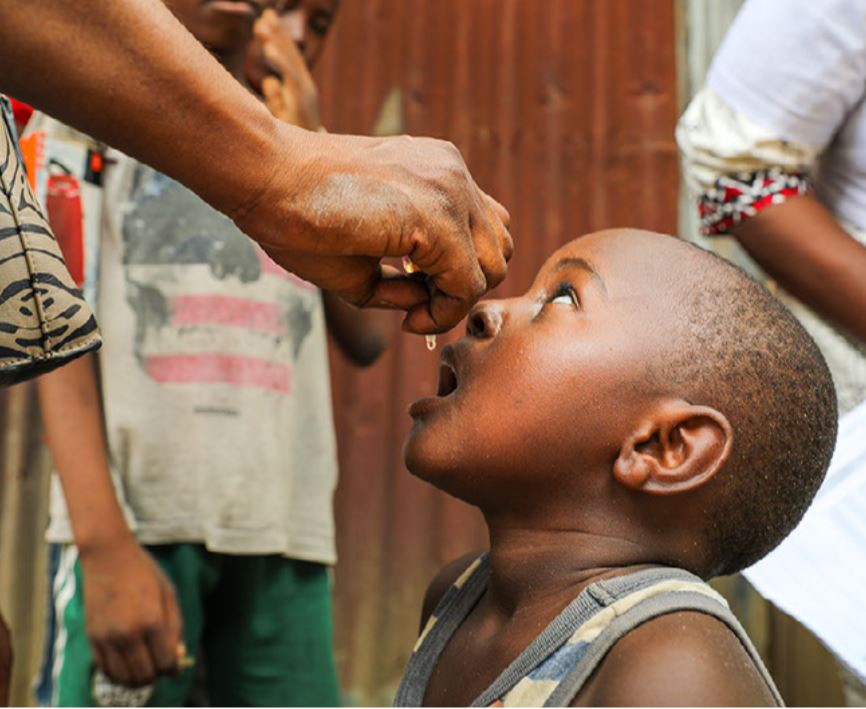The subnational campaign will vaccinate children aged under five in accessible states
 17 August 2024, Port Sudan, Sudan – More than 2.9 million children under five will be vaccinated against polio in the second round of a house-to-house vaccination campaign in seven states. The Federal Ministry of Health, with support from the World Health Organization (WHO) and United Nations Children’s Fund (UNICEF), will conduct the vaccination campaign from 19 to 22 August 2024. Around 7500 vaccinators will provide two drops of the novel oral polio vaccine type 2 (nOPV2) to children under the age of five in seven states, starting with River Nile, Gedarif, Kassala, Northern and Red Sea states, followed by Blue Nile and White Nile states.
17 August 2024, Port Sudan, Sudan – More than 2.9 million children under five will be vaccinated against polio in the second round of a house-to-house vaccination campaign in seven states. The Federal Ministry of Health, with support from the World Health Organization (WHO) and United Nations Children’s Fund (UNICEF), will conduct the vaccination campaign from 19 to 22 August 2024. Around 7500 vaccinators will provide two drops of the novel oral polio vaccine type 2 (nOPV2) to children under the age of five in seven states, starting with River Nile, Gedarif, Kassala, Northern and Red Sea states, followed by Blue Nile and White Nile states.
“Given the dire conditions our country is facing, we want to urge all caregivers in the states being covered to make the most of the opportunity that the upcoming polio campaign presents and to ensure children under five years of age receive oral polio vaccines. We owe it to our children to protect them from diseases that can be prevented as the ensuing conflict continues to inflict additional trauma on their well-being,” said H.E. Dr Haitham Mohamed Ibrahim Awadallah, Federal Minister of Health, Sudan.
National vaccination coverage in Sudan has plummeted from 85% before the war to around 50%. In active conflict zones the rates are averaging at 30%, a critically low rate of coverage. The delivery of vaccine supplies and routine immunization activities have been hindered by security concerns and lack of access.
Links between variant poliovirus strains in Sudan and those detected in Egypt, South Sudan and Yemen in 2024 highlight the risk of the poliovirus spreading across borders. Polio is currently one of only two Public Health Emergencies of International Concern, the highest level of alert that WHO attributes to bring attention to the potential international spread of disease.
“Despite a skeletal health system and the very real threat of growing conflict, our teams are leaving no stone unturned to ensure surveillance for poliovirus and routine immunization continues to function, even in a limited capacity, and that polio vaccines reach children wherever they are accessible. Our teams are constantly exploring ways to make this happen, thanks largely to support from our partners,” said Dr Shible Sahbani, WHO Representative in Sudan.
Concurrent outbreaks of multiple other diseases, including cholera, dengue, malaria and measles, are prevalent in at least 12 of Sudan’s 18 states. The Federal Ministry of Health, supported by WHO, UNICEF and partners, is making concerted efforts to ensure children in Sudan still receive childhood vaccinations, including polio vaccines, through routine immunization services.
“With the heavy rains and flooding, deadly diseases can spread rapidly. When children get sick, they become more susceptible to malnutrition and malnourished children are at heightened risk of getting severely ill. It is a vicious circle, and ensuring all children are vaccinated is essential,” said Sheldon Yett, UNICEF Sudan Representative.
Sudan has previously demonstrated strong outbreak response capacity, having closed the last cVDPV2 outbreak in 18 months. To raise awareness of the risks of polio spread and mobilize caregivers to accept polio and other life-saving vaccines, Sudan has, with support from partners, rolled out comprehensive social mobilization and community engagement plans.
Note to editors:
Since the start of the circulating variant poliovirus type 2 (cVDPV2) outbreak in September 2023, cVDPV2 has been detected in eight wastewater samples in Red Sea and White Nile States.
In June 2024, as part of efforts to halt poliovirus spread, a polio vaccination campaign delivered nOPV2 and vitamin A to around 3.3 million children under five years, including children from newly displaced communities, in eight states.
Surveillance for poliovirus has been sustained, despite the complex context. Health teams have been searching for acute flaccid paralysis (AFP), a tell-tale symptom of polio, in children, and for poliovirus in wastewater samples collected at six environmental surveillance sites. Ten batches of samples have been delivered to a polio lab in Egypt since the start of the ongoing conflict.
For additional information, contact:
Mr Ismail Elshaik, Federal Ministry of Health EPI Manager,
Eva Hinds, UNICEF Sudan Chief of Communication,
Loza Mesfin Tesfaye, WHO Sudan Communications Officer,


